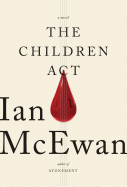
The title The Children Act refers to the 1989 British law providing for government intervention in situations where parental ability or conviction threaten to harm a child. Ian McEwan (Atonement) uses it to frame a character-driven story about the consequences of unspoken intentions.
At 59, Fiona May is at the height of her career. She's a highly respected judge specializing in family law, particularly in cases complicated by religion. She is famous for a ruling in favor of separating conjoined infants who would otherwise both have died to ensure one would survive, against the wishes of the parents and the Catholic Church. Her decision haunts her despite the resulting acclaim. She has just seen the case of Adam, a lovely and gifted Jehovah's Witness, just shy of legal adulthood, who is dying of leukemia. For reasons of faith, Adam and his parents refuse the blood transfusions needed to save his life. In crisis, she visits the hospitalized Adam to assess the clarity of his wishes. Can Fiona overrule a boy's choice, which is based on his sincere belief? Can a teenager know what he really wants? She has withdrawn into the details of the case when her husband, Jack, shocks her with his threat to embark on an affair in reaction to their sterile marriage.
McEwan seems less interested in exactly how Fiona will decide her case or whether her marriage will survive; instead, The Children Act derives its power from the character's infinitely varied and intimately observed emotional responses--encompassing anger, grief, hope, joy and fear--to love offered or withdrawn. --Jeanette Zwart, freelance writer and reviewer

